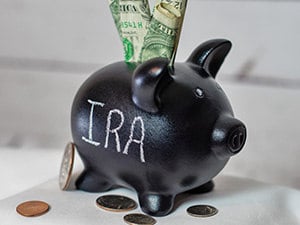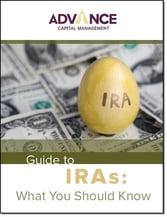Should You Be Saving in an IRA?
February 20th, 2019 | 3 min. read

You know you want to retire at some point. What you may not know is if you’re doing all the right things to get there. Are you saving enough? Are you even saving in the appropriate retirement account?
It’s easy to get lost in the alphabet soup and jargon of retirement savings accounts and products. 401(k). 403(b). Roth. Annuities. Who should have what?
Then there’s the IRA, or individual retirement account. An IRA is one of the most effective ways to save for retirement. But most people will use an employer-sponsored plan as their primary savings account, creating confusion as to who really needs an IRA anyway.
There are a variety of reasons to consider saving in an IRA, not the least of which is the significant tax breaks. Still, the decision depends on several personal factors. Here is some information to help you determine if saving in an IRA is right for you.
What is an IRA?
An IRA is a type of investment account in which you save and invest money to fund your retirement goals. The two most common are the traditional IRA and Roth IRA. (For more, read Is a Roth or Traditional IRA Better?) You can open an IRA with Advance Capital Management or many other financial institutions.
You typically contribute money to the account directly from your paycheck. Then you purchase investments (mutual funds, individual stocks, bonds, etc.) to help grow that money to eventually withdraw as income in retirement.
IRA Benefits
One of the key advantages to saving for retirement in an IRA is the tax benefits. Contributions to traditional IRAs may be tax-deductible, depending on your income. Roth IRAs, meanwhile, let you withdraw money tax-free. Both traditional and Roth IRAs investment earnings grow tax-deferred. In a traditional IRA you don’t owe taxes on those earnings until you withdraw the money; meanwhile, in a Roth IRA, you may withdraw them tax free.
IRAs also provide some investment advantages over employer-sponsored accounts, such as 401(k)s and 403(b)s. You can choose from all publicly available investments instead of a limited menu and you can elect to have your IRA directly managed by a financial adviser.
General IRA Rules
Before investing in an IRA, you need to know that there are rules. Although rules vary by type, there are some that apply to nearly all IRAs.
Firstly, the IRS limits the amount you can contribute into an IRA each year. The annual contribution limit for traditional and Roth IRAs is $6,000 ($7,000 for those age 50 and older) in 2019. That is much lower than a 401(k), which is $19,000 ($25,000 for those age 50 and older). However, IRAs designed for self-employed workers and small business owners offer most savings room. For example, the maximum annual SIMPLE IRA contribution is $13,000 ($16,000 for those age 50 and older).
Secondly, if you withdraw money from an IRA before age 59 ½, you may be subject to a 10% federal penalty tax on top of ordinary income taxes. Exceptions include: a first-time home purchase, qualified higher education expenses and disability.
Finally, traditional IRAs are subject to annual required minimum distributions (RMDs), the amount the federal government requires you to withdraw from retirement accounts upon turning age 70 ½. Roth IRAs are not subject to RMDs.
Who should save in an IRA?
The leavers
Often, workers who are leaving a job or nearing retirement will consolidate retirement accounts from former employers by rolling them over into an IRA. It’s a convenient way to manage your retirement savings in one place. Not to mention a way to gain greater flexibility in how you invest your savings.
The savers
An IRA is also a good supplemental option for those fortunate enough to max out their company retirement accounts and want to save more. You won’t find many retirees who say they saved too much.
The haters
Further, if you are dissatisfied with the investment options in your company retirement account, then consider saving in an IRA instead. That is, as long as you still save the minimum in your company account to receive the full matching contribution, if available. Some people may also find it more advantageous to save in a Roth IRA for its unique tax breaks. (For more, read: Making the Pre-Tax vs. Roth Decision.)
The entrepreneurs
Lastly, some IRAs are specifically designed for small business owners and their employees and self-employed workers to save for retirement. These are SEP IRAs and SIMPLE IRAs.
There are a lot of moving parts when it comes to saving for retirement. And, rarely is the way forward clearly laid out in front of us. There are good reasons for just about anyone to save in an IRA. But, questions of when, how much and what type are best answered with the professional guidance of a financial adviser.
Learn more about saving and investing in an IRA by downloading our Guide: IRAs: What You Should Know. Whether you’re a stay-at-home parent, small business owner, freelancer or someone who just doesn’t like their 401(k), our guide explains how you can save for retirement. (Click button below.)

Advance Capital Management is a fee-only RIA serving clients across the country. The Advance Capital Team includes financial advisers, investment managers, client service professionals and more -- all dedicated to helping people pursue their financial goals.

